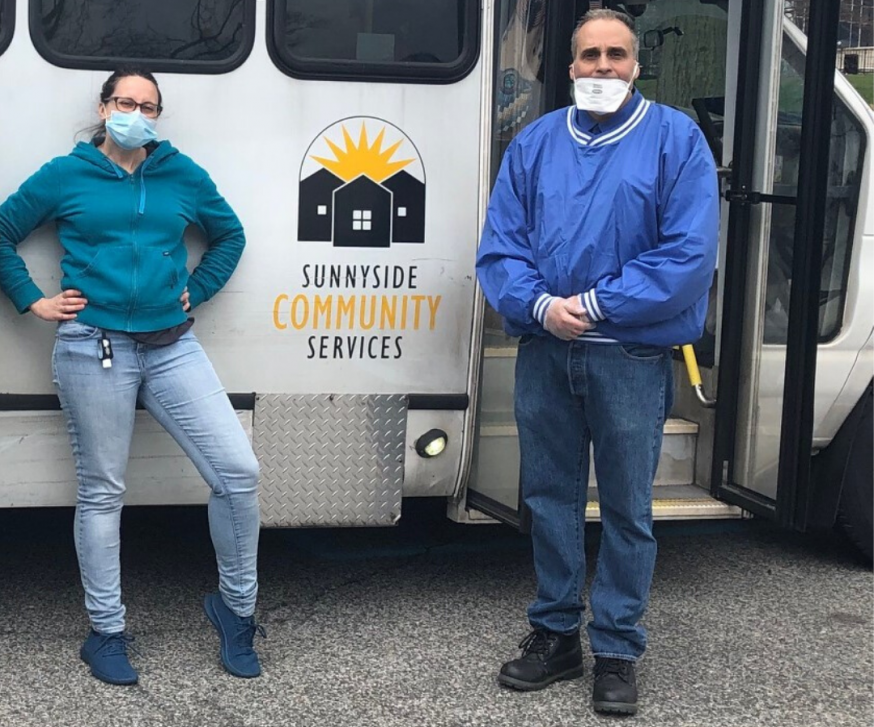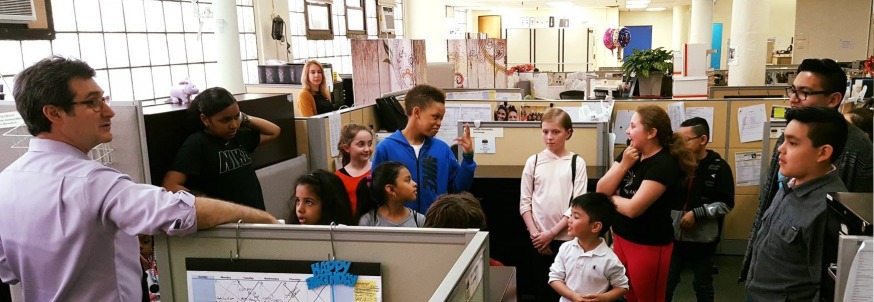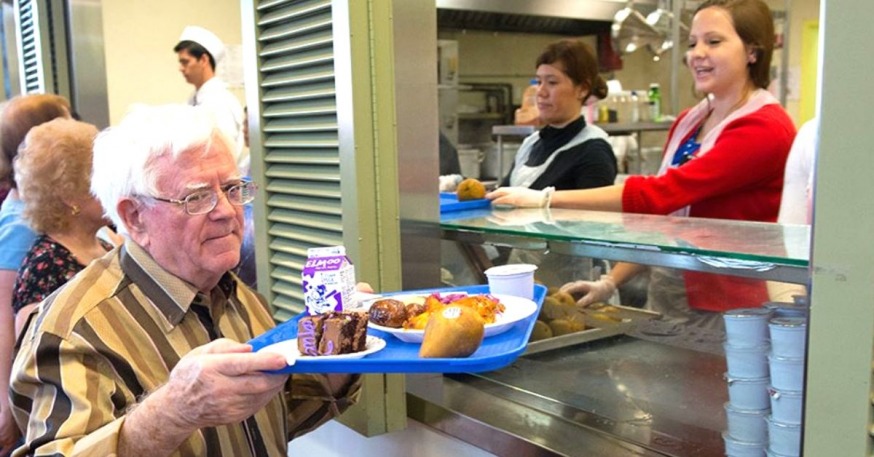
SCS Staff Preparing Food Deliveries to Seniors (Photo: Instagram @scsny)
May 12, 2020 By Michael Dorgan
Sunnyside Community Services is operating under a cloud of uncertainty as it waits on the city to announce its impending budget cuts that will greatly affect its programming.
The community-based non-profit provides a wide range of essential programming for individuals of all ages– from pre-K through to senior services.
SCS serves more than 16,000 people each year but the future of several of its programs is under threat as the city looks to slash its budget, according to SCS Executive Director Judy Zangwill.
“We’re hearing the cuts could be pretty draconian,” Zangwill said. “Everything is now in doubt,”
The impending cuts come as the mayor plans to shave $2.7 billion from the city budget for fiscal year 2021 – given the lost tax revenue with the COVID-19 shutdown. The city budget will go into effect for the year starting July 1, and the mayor and the city council must enter to an agreement on it first.
The city provides SCS with around $600,000 in discretionary funds each year, which helps pay for many of its programs. Leaders at SCS expect a large portion of this funding to be cut as part of the upcoming budget.
Senior Programs
Many of the community’s most vulnerable people rely heavily on SCS programming. SCS uses money from the city’s discretionary budget to help finance its senior programs which means that all of these programs are now in doubt.
Around 5,000 residents depend on SCS senior programming each year which includes, meals on wheels, home care help and care assistance counseling – which helps seniors access benefits and entitlement programs. Many of these services face being slashed.
The future of the organization’s mental wellness program for seniors – which provides professional counseling at its center – is also unclear. Monica Guzman, Director of Development at SCS said that the future of this service is of particular concern because it served as a critical outlet for seniors before the virus struck.
“Seniors were isolated before but at least they could come to group counseling and meet with counselors, she said.
“Even now it is all done over the phone so to take something like that away would be really profound, it would be devastating,” she said.
Guzman is concerned about a spike in the rate of suicides in Queens and that any reduction in programming due to budget cuts may exacerbate mental health issues among seniors. Recently the Queens District Attorney’s office revealed that suicides doubled in Queens between March 15 and April 28 compared to the same time last year.
“Our mental health programs for seniors are entirely funded by discretionary dollars and right now it could not be more critical, the fact that our counselors can check in with our seniors who are facing increased isolation,” she said.
The popular Center for Active Older Adults programming typically have up to 300 seniors visit the 39th Street center for recreational, fitness, and educational activities daily. The future of this program is also facing uncertainty should the discretionary budget be slashed.
Here, seniors are also provided with a hot meal and the program played an important role in connecting seniors with one another, according to Guzman.
The program was temporarily suspended in March due to COVID-19 restrictions and Guzman said that it has already taken a significant toll on its seniors. For example, the center’s senior assistance phone line, which provides help to seniors, has seen a surge in calls. In the five-week period since its suspension, the service received almost 1,100 calls. The same period would usually see around 200 calls, Guzman said.
The potential cuts come at a time when SCS senior members are already living in fear. Since the pandemic struck, 48 people who are members of SCS programs have died from COVID-19 and another 65 have tested positive. Most of these victims were senior citizens.
“We have no idea what the future will bring for the seniors at the center – we’re used to having a very bustling center with hundreds of people there a day for meals and activities.
“We just don’t know if and when that can begin again and we haven’t really heard from the leadership to say what the plan is,” she said.

Youth Programs
The city budget has yet to be released but SCS has already been forced to scrap some of its youth programming.
The non-profit has canceled its summer camp program after NYC Department of Youth and Community Development (DYCD) – which finances the program – pulled its $750,000 contract last month. The funding allocated to SCS to cover the cost of the camp program is separate from the $600,000 that it receives from the city’s discretionary budget.
DYCD cited uncertainty surrounding COVID-19 as the reason it pulled the camp funding and instructed SCS not to enroll any students for the summer program.
Every year around 1,000 youths sign up to the summer camps which run from early July until late August. Guzman said that children will be left with nothing to do during the summer months, piling even more pressure on stressful households.
“I don’t know what they [the city] expect the kids to do? They don’t want them outside, they don’t want them engaged remotely so what are they supposed to do?”
SCS summer camps typically employ about 100 full-time and part-time staff for the summer programs. These workers will now be out of a job this summer, she said.
The Summer Youth Employment Program, commonly known as SYEP has also been canceled. SCS helps employ around 200 high school students on paid internship roles at camps, businesses and other organizations for the summer. The funding for this program has already been cut by DYCD.
Guzman said that the job losses from SYEP will have a devastating impact on local families who are already suffering financial hardship during the economic shutdown.
“These workers help their families with the household expenses through the summer so it’s a really big hit, their parents may be unemployed then they can’t depend on this money either,” she said.
After-school programming
The future of SCS’ after-school programming is also unclear. SCS fears that DYCD – which funds part of the after-school program – will look to make cuts here too.
Around 2,500 children rely on the programming for extra learning throughout the school year which serves as a critical component to children’s educational development, Guzman said.
Woodside on the Move, another local non-profit that offers similar youth programs, has said that around 150 of its after-school programming slots could also be terminated due to a lack of city funding.
SCS operates after-school programming at nine different locations across the community, including at its center on 39th Street but leaders are unsure as to how many of its slots are under threat.
The other SCS after-school locations are at Woodside Houses, Boulevard Family Residence, and at the following schools: IS5; PS150; PS199; PS343; and Queens Tech High School.
Adult literacy programs such as ESOL (English for Speakers of Other Languages) are also expected to be diminished. SCS has over 350 program participants for this program each year.
For more information on Sunnyside Community Services program updates related to COVID-19, click here. To make a donation to SCS programs, click here.








